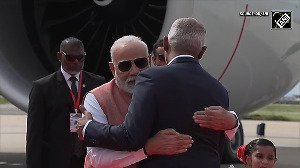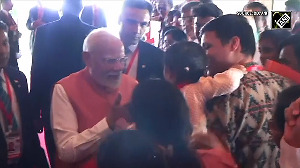Even if the SP doesn’t immediately withdraw support, the UPA government will remain helplessly dependent on the SP and the BSP. Withdrawal of support by either could destroy the UPA’s paper-thin majority. It will have to do a balancing act between these two rivals on a day-to-day basis, says Praful Bidwai
When the Trinamool Congress, the second largest component of the United Progressive Alliance, with 19 members of Parliament, walked out of it last September, nobody thought that its departure would immediately destabilise the government. Although the UPA’s Lok Sabha strength suddenly fell to 254, well below the effective half-way mark (271), it seemed confident of retaining the “outside support” of as many as 28 MPs belonging to Mayawati’s Bahujan Samaj Party (21), Lalu Prasad’s Rashtriya Janata Dal (4) and the HD Deve Gowda-led Janata Dal-Secular (3).
Although the support of Mulayam Singh Yadav’s Samajwadi Party (22) remained uncertain, the pro-UPA numbers still added up to a clear majority of 282 seats.
But the picture changed dramatically on March 19, when the Dravida Munnetra Kazhagam, with 18 MPs (and the one-member ethnic-Tamil Viduthalai Chiruthaigal Katchi), quit the UPA on the issue of condemning as “genocide” the killing of thousands of Tamil civilians in Sri Lanka during the final phase of the Fourth Eelam War in 2009.
The DMK, a Congress-UPA ally since 2004, had demanded a tough resolution against the Sri Lankan government at the UN Human Rights Council. It was posturing for self-serving reasons. It did nothing to help the Sri Lankan Tamils for years, nor raise the issue of the killings until recently.
The DMK’s real grouse with the UPA was probably that its MPs, including DMK president M Karunanidhi’s daughter K Kanimozhi and former telecom minister A Raja, were detained for long months on serious corruption charges in the 2G telecom scam. A new charge-sheet against Kanimozhi, soon expected to be filed by the Enforcement Directorate, could lead to her re-arrest and attachment of her property.
The DMK was disingenuous in playing to the ethnic-Tamil gallery. But by quitting, it rendered the UPA super-vulnerable. Mulayam Singh was quick to seize the chance to needle the UPA. The proximate reason was Union steel minister Beni Prasad Verma’s charge about his alleged links to “terrorism”. Yadav was especially miffed because Verma is a former friend and fellow-Socialist.
Having first accepted Verma’s apology, Yadav abruptly changed his stand and decided to disrupt the working of Parliament -- until Congress president Sonia Gandhi, Prime Minister Manmohan Singh and Home Minister Sushilkumar Shinde went down on their knees to placate him. On a charitable interpretation, Yadav was perhaps only testing how the UPA leadership would cope with the fluid political situation -- and its own vulnerability.
Then came Yadav’s surprising statement on March 23 rebuking his own son, Uttar Pradesh Chief Minister Akhilesh Yadav, for poor governance, and praising Bharatiya Janata Party leader LK Advani as “an honest politician” who “never lies”. Why, he quoted Advani on UP’s deteriorating law and order situation even while he accused the UPA of being corrupt and weak.
By putting down his son, Yadav was trying to assert himself as a high-stature elder statesman with a legitimate aspiration to a prominent national role. His praise for Advani was astonishing given his past adversarial relationship with the latter and the BJP’s campaign against “Maulana Mulayam” in the early 1990s for his defence of Muslims against Hindutva forces.
Yadav is known to keep his cards close to his chest and spring political surprises on the unlikeliest of issues. This became evident a year ago on the choice of the chief minister when his party won an impressive victory in UP. After keeping everyone in suspense, he overruled senior SP leaders Shivpal Singh Yadav and Azam Khan by appointing Akhilesh, not himself, to the post.
During the Presidential election last July too, Yadav’s lieutenants, including his brother Ram Gopal Yadav, indicated that he favoured the UPA’s candidate, Pranab Mukherjee. But he surprised all by joining Mamata Banerjee to propose three impossible-sounding nominees: former President APJ Abdul Kalam, former Lok Sabha Speaker Somnath Chatterjee and serving prime minister Manmohan Singh, no less. Yet, after meeting Sonia Gandhi, he suddenly backed Mukherjee.
True, Yadav is mercurial and often unpredictable. Even so, his motives in praising Advani are hard to fathom precisely. Only three factors explain it: a calculated tactic to “soften up” the BJP (in case the UPA retaliates against him), to sow confusion within the Sangh Parivar, and to take the limelight away from Narendra Modi as the BJP’s front-runner prime ministerial aspirant. Flummoxed, the BJP president “clarified” that the SP isn’t leaning towards the BJP.
Yadav knows that Modi, who presided over Independent India’s worst butchery of Muslims, would sharply polarise opinion in the next election to a point that Muslims might vote en masse for the Congress -- primarily to keep the BJP out of national power. This wouldn’t work to the SP’s benefit, either in UP or nationally. So Yadav craftily insinuated Advani into the picture.
The tactic may or may not work. But Yadav has raised the possibility -- and underscored his insistence -- that the electoral race must be more open than appears to many who are unduly influenced by the media’s portrayal of it as a black-and-white presidential system-style contestation between Messrs Rahul Gandhi and Narendra Modi.
Since then, Yadav has also made overtures to Messrs Nitish Kumar and Sharad Pawar, and his son has said that the SP may withdraw support to the UPA in the ongoing budget session of Parliament. Akhilesh Yadav told the Aaj Tak television channel: “You will see what happens in the budget session. Our party brass will decide when we pull the plug…We have our political blueprint ready after the pullout. We are ready for elections anytime. If parliamentary elections are held in October, it will be an ideal situation for us. But we are ready for any eventuality.”
For good measure, he added: “The Congress cannot tame us into submission with the fear of the CBI…we have given unconditional support to the UPA to keep communal forces at bay…”
Withdrawal of support by the SP would put the UPA’s survival at immediate risk. The SP is keen that the next Lok Sabha election is held sooner rather than later -- before it gets further discredited by scandals such as former minister Raghuraj Pratap Singh’s recent involvement in a police officer’s murder, on top of numerous criminal charges against him, besides growing lawlessness and communal tensions, and mounting evidence of favouritism, maladministration and corruption.
Even if the SP doesn’t immediately withdraw support, the UPA government will remain helplessly dependent on the SP and the BSP. Withdrawal of support by either could destroy the UPA’s paper-thin majority. It will have to do a balancing act between these two rivals on a day-to-day basis.
The UPA is also looking for an insurance policy against the possible failure of such an act. It’s trying to neutralise Nitish Kumar by granting “special status” to Bihar. (Hence Mulayam Singh’s overture to Kumar). But this may not help it pass the Food Security law and various other Bills.
Tensions between UPA supporters are likely to come to a head on women’s reservations in legislatures and quotas for Scheduled Castes and Tribes in promotions in government jobs. The allies are divided on both. The BSP insists on SC-ST quotas, but the SP strongly opposes them. A clash on such potent issues could bring down the government.
Only two developments can halt the UPA’s downhill political trajectory. The first is a set of bold pro-people measures, including expansive initiatives on food security, shelter, healthcare and other social agendas. This could infuse new energies into Indian society and lend UPA-2 the élan and popular appeal it lacks, thus giving it some political leverage over its unreliable allies, or at least help neutralise them in the short run.
The second is a handsome victory for the Congress in Karnataka in the coming assembly election, which boosts the confidence with which the party goes into the next Lok Sabha contest. This could have a particularly reinvigorating impact if it’s followed by a Congress alliance or understanding in Andhra Pradesh with Jaganmohan Reddy’s party, which allows the two to pool their resources in the two regions where they are strong: respectively, Telengana and Rayalaseema-Coastal Andhra.
The UPA seems loath to take the first initiative, hemmed in as it is by its own conservative policymakers and business lobbies. It’s under pressure to do just the opposite, supposedly to revive growth. It thus risks losing a big opportunity to do well by the poor who long for a new deal.
The second development could well happen, at least in Karnataka, where the BJP is in disarray and faces opposition from former chief minister and leader-turned-rival BS Yeddyurappa. But to bring about the paradigm shift needed in Andhra Pradesh, UPA-2 will have to show more gumption and tact than it has exhibited so far. Or, coupled with reluctance to take pro-poor steps, its tenure could turn out a wasted second innings.








